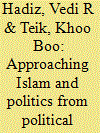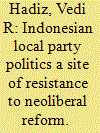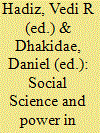| Srl | Item |
| 1 |
ID:
106787


|
|
|
|
|
| Publication |
2011.
|
| Summary/Abstract |
The article traces the trajectories of Islamic politics in Indonesia and Malaysia in relation to the changing political economy of these two countries. The approach adopted is to understand Islamic politics less on the basis of Islamic doctrine, or conflicts over its interpretation, than in connection with the changing social bases of politics, the context established by capitalist economic transformations, the evolution of the post-colonial state from the Cold War and its aftermath, and of crises of political economy in the 1980s and 1990s. The exercise reveals important convergences and divergences in trajectories that help to explain the complex historical processes which have shaped Islamic politics in these two cases and possibly beyond. It also reveals the entanglement of Islamic politics in very profane conflicts over power and tangible economic resources over time. In both countries a new form of Islamic populism has emerged as a major articulator of grievances against the secular state and perceived social injustices. However, the same historical processes have enabled the social agents of Islamic politics in Malaysia to contest state power more effectively than their counterparts in Indonesia.
|
|
|
|
|
|
|
|
|
|
|
|
|
|
|
|
| 2 |
ID:
155094


|
|
|
|
|
| Summary/Abstract |
Few countries have been burdened with such great expectations as Indonesia and have failed to meet them in the ways expected. Economists have persistently predicted that Indonesia could be an economic giant in the region, challenging the state-led economies of Northeast Asia on the basis of free market policies. After the fall of Soeharto in 1998, pluralist political scientists saw Indonesia as a shining light for democratic transition. More recently, Indonesia has been hailed as a model for how democracy might work in a Muslim-majority country. Yet, we are still waiting for a new economic giant to emerge while democracy has not been able to resolve growing concentration of power and wealth in Indonesian society or to stem growing social resentment. Reactionary Islamic populism has often threatened Indonesia's reputation for religious moderation. Why have so many analysts had such great expectations of Indonesia and how have they explained the seeming disappointments? We propose that the institutions of markets and democracy are not a good starting point for explaining things. The problem lies in the way economic and social power is constructed and in the interests of powerful oligarchies that continue to dominate the political and economic landscape.
|
|
|
|
|
|
|
|
|
|
|
|
|
|
|
|
| 3 |
ID:
058092


|
|
|
| 4 |
ID:
190425


|
|
|
|
|
| Summary/Abstract |
This article investigates the link between growing precarity – associated with the process of neoliberal economic globalization – and growing Islamist tendencies in Indonesian society, through a case study of app-enabled transport workers. It applies a Gramscian notion of common sense to understand workers’ responses to their experiences of socio-economic marginalization and the articulation of their grievances. The combination of the near hegemony of a neoliberal worldview that encourages individual entrepreneurial prowess and an Islamist focus on moral self-cultivation inadvertently contributes to workers’ normalization of their precarity, furthering the atomization of the workforce. It also helps provide the setting for mobilizations of the urban precariat under Islamic banners, without challenging the imposition of neoliberal ideology on work and life.
|
|
|
|
|
|
|
|
|
|
|
|
|
|
|
|
| 5 |
ID:
066827


|
|
|
|
|
| Publication |
Jakarta, Equinox Publishing, 2005.
|
| Description |
xxi, 281p.hbk
|
| Series |
Celebrating Indonesia Series
|
| Standard Number |
9793780010
|
|
|
|
|
|
|
|
|
|
|
|
Copies: C:1/I:0,R:0,Q:0
Circulation
| Accession# | Call# | Current Location | Status | Policy | Location |
| 050427 | 959.8/HAD 050427 | Main | On Shelf | General | |
|
|
|
|
| 6 |
ID:
151733


|
|
|
|
|
| Summary/Abstract |
This article examines the Darul Islam (DI) movement in Indonesia, which has sought to establish an Islamic state since the end of the colonial era. It questions why the movement has been resilient in spite of almost perennial political isolation and marginalization and numerous internal permutations. The article argues that the evolution of the movement has been intricately related to the exigencies of operating in the context of profound social, economic, and political changes associated with state formation and capitalist development in Indonesia since the 1940s. The DI experience helps us to understand the appeal of radical Islamist movements which voice dissent against perceived social injustices within national states where the left is no longer a viable social force.
|
|
|
|
|
|
|
|
|
|
|
|
|
|
|
|
| 7 |
ID:
085877


|
|
|
|
|
| Publication |
2009.
|
| Summary/Abstract |
Paul Carnegie's article (this volume) proposes a primarily actor-centred approach, clearly very much influenced by the well-known literature on " democratic transitions,"by which to assess the Indonesian trajectory since 1998.
|
|
|
|
|
|
|
|
|
|
|
|
|
|
|
|